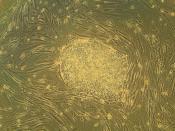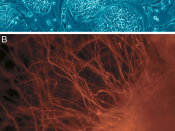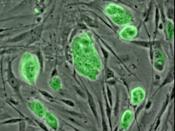AbstractEmbryonic stem cells are controversial. They come from the inner cell mass of a blastocyst, the term for a fertilized egg four days after conception. But while many pro-life advocates stand firm in their opposition to using embryonic cells for research, others, have cast their lot with the scientific community in favor of continuing research funding (Varmus, 1998).
Embryonic Stem Cells HistoryStem cell research is a complicated subject, not only scientifically but ethically as well. Many of has seen the emotional pleas made on television for stem cell research support, made by politicians and actors such as Michael J. Fox, who suffers from the degenerative disease called Parkinson's. However, many individuals do not know what stem cells can actually do for us? Stem cells have the remarkable potential to develop into many different cell types in the body. Serving as a sort of repair system for the body, they can theoretically divide without limit to replenish other cells as long as the person or animal is still alive.
When a stem cell divides, each new cell has the potential to either remain a stem cell or become another type of cell with a more specialized function, such as a muscle cell, a red blood cell, or a brain cell.
Embryonic Stem Cells Research Is NeededThe main argument for stem cell research is obviously that it could lead to major medical advancements. It could be used to treat countless diseases, including Parkinson disease, and possibly Alzheimer's, and therefore improve the lives of millions. Stem cells have already been tested on some human patients and shown results. So, a use for them could come in the very near future. In addition, looking farther into the future stem cell research holds all kinds of possibilities. Imagine if doctors could someday grow organs for...


